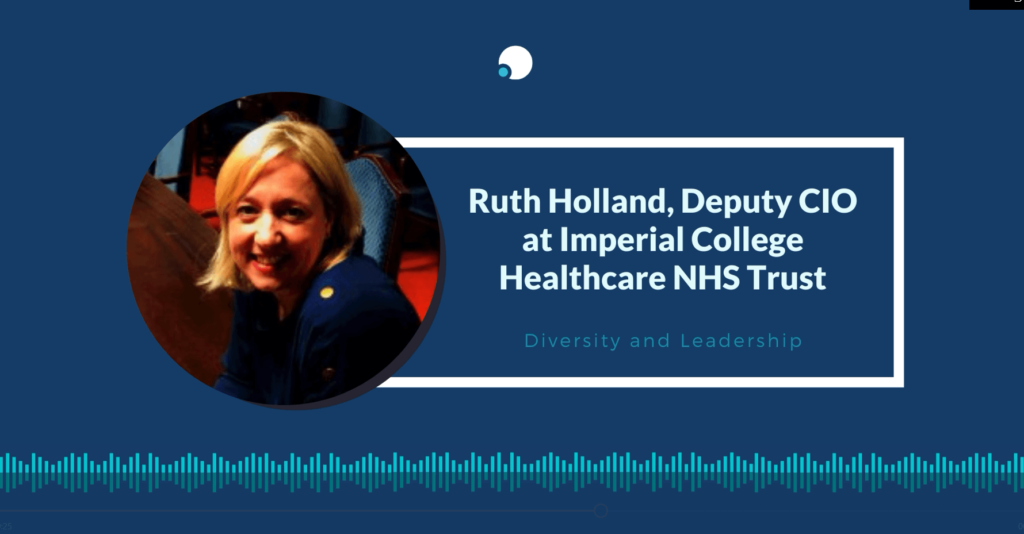
We spoke to Ruth Holland, Deputy CIO at Imperial College Healthcare NHS Trust to discuss her career, being a mentor and dealing with setbacks.
Ruth’s story is part of a series of articles highlighting the careers of female tech leaders within the NHS. We’ve brought together these stories in an effort to prove that the route to leadership is never a straight line.
As Deputy Chief Information Officer at Imperial College Healthcare NHS Trust, Ruth works across Northwest London in a large organisation providing acute and specialist care like maternity care and emergency departments as examples.
Ruth, whose background is in Scientific Research, fell into healthcare.
“My first full-time job was working on a research study trying to track the spread of tuberculosis in London. And from that, I fell into health care, and digital. It certainly wasn’t something that was discussed when you’re having those sessions with the careers advisors at school or university.”
Despite not planning on entering healthcare and digital career, Ruth forged a lifelong passion for both complementary industries.
Ruth, like many, found their passion through hard work and commitment. But it wasn’t always smooth sailing.
One of the areas most people struggle with while forging their career is the disappointment of being rejected from roles they thought were right for them. Like most, Ruth had bumps in the road that helped her work towards the level of resilience needed to achieve consistently at the highest level.
“There’s naturally disappointment, but it’s about dusting yourself off and reflecting. Did you do enough research? Did you prepare well enough? Most importantly, was it the right fit for you in the first place?”
At the age of 31, Ruth moved onto the board of an NHS acute trust in south-east London. Her approach to leadership, a balance of empathy and resilience, has seen her drive digital transformation in the NHS. Her achievements are without a doubt, but it’s never that simple.
“I regularly used to think someone was going to come and tap me on the shoulder and say, Oh, you, what are you doing here?”
Empathy, balanced with resilience is an incredibly potent combination. For many, the theory seems sound – but applying it is another story altogether. Elements of doubt begin to creep in as you climb the career ladder. This doubt is commonly known as Imposter Syndrome and it’s something that adversely affects women.
According to a report by Access Commercial Finance, a survey of over 3000 adults in the UK shows over two-thirds of women (66%) have suffered from imposter syndrome compared to over half of men (56%) within the last 12 months (2019).
“People don’t admit to it happening to them nearly as much as they should.”
Overcoming imposter syndrome isn’t easy. For Ruth, it was about finding support around her from those who are suffering as well.
“Both myself and an HR Director had been given board responsibilities at the same time. We leaned on each other for support. That sisterhood was invaluable to curbing feelings of imposter syndrome and focusing on doing the work.”
Mentoring is important. It can help professionals breakthrough the stages of their careers and achieve their potential. Mentoring is also tricky. It requires commitment and flexibility on the part of both the mentor and the mentee. All too often mentorship programmes or relationships ‘fail’ because they haven’t been flexible enough to fit into already busy lives.
Ruth, who is keen on mentoring as a solution to addressing the inequalities and imbalances in the business ecosphere, is working hard on cultivating an agile approach to mentoring.
“Mentoring needs to fit around people’s commitments at home and work. The remote working policies that are being introduced at the trust will hopefully encourage more flexibility.”
There once was a time where you could’ve got away with describing digital as a back-office function within the NHS.
Now, the NHS is currently in a state of rapid transformation. With COVID necessitating certain adjustments to the way we operate, transformation leaders are driving significant business change. For Ruth, who sits at the tip of the digital transformation spear for the NHS, it’s all about data.
“COVID has really shone a spotlight on how important it is. The accessibility of data and our ability to share that data. Daily COVID briefings and major stakeholders using dashboards had planted the seeds for a data-driven NHS. Perhaps in 10 years we’ll have Chief Data officers on the boards of the more forward-thinking, acute NHS organisations, as well as Chief Technology officers. I think that’s probably a trend that we’ll see.”
With her children growing up, Ruth is setting her sights back on board level work once again. With her previous experiences at that level and a strong support network around her, she’s confident she’ll be back when she’s ready.
“I’ve been through that test for myself before. I’m not in a rush.”